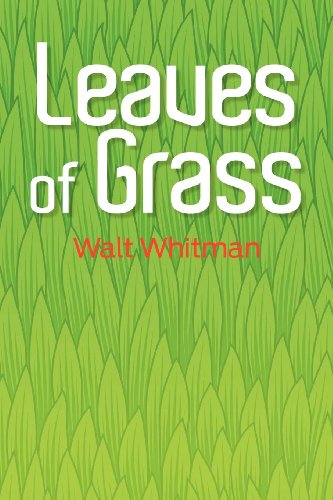All Nonfiction
- Bullying
- Books
- Academic
- Author Interviews
- Celebrity interviews
- College Articles
- College Essays
- Educator of the Year
- Heroes
- Interviews
- Memoir
- Personal Experience
- Sports
- Travel & Culture
All Opinions
- Bullying
- Current Events / Politics
- Discrimination
- Drugs / Alcohol / Smoking
- Entertainment / Celebrities
- Environment
- Love / Relationships
- Movies / Music / TV
- Pop Culture / Trends
- School / College
- Social Issues / Civics
- Spirituality / Religion
- Sports / Hobbies
All Hot Topics
- Bullying
- Community Service
- Environment
- Health
- Letters to the Editor
- Pride & Prejudice
- What Matters
- Back
Summer Guide
- Program Links
- Program Reviews
- Back
College Guide
- College Links
- College Reviews
- College Essays
- College Articles
- Back
Leaves of Grass by Walt Whitman
Leaves of Grass is a collection of poems written by Walt Whitman. The poems are written at different points in his life and they are arranged chronologically. There are 10 poems total, starting with “Starting from Paumanok” and ending with “Song of the Open Road.”
“Starting from Paumanok” is essentially a list where Whitman explains everything he intends to write about. He writes about where he grew up, Paumanok (a Native American name for Long Island), he writes a long list of names, places and machines he feels are important. When read on the surface, one could find the piece to be boring and meaningless. But when investigated on a deeper level, readers can find Whitman’s poetic voice arise and break the monotonous voice the poem would otherwise possess.
The final poem, “Song of the Open Road,” is a lyrical a rhythmic piece that can, at times, sound more like a song that a poem. By Whitman’s standards, it is slightly more conventional; however, the poem still maintains Whitman’s recognizable traits such as repeating phrases and stanzas throughout the work. “Song of the Open Road” is the last poem, and, because the works are arranged chronologically, it ends with the author’s death. For the final line of the poem, Whitman writes, “Sure as the stars return again after they merge in the light, death is great as life.” This ending line shows that Whitman is not afraid of his inevitable death, because he knows that his life has been fulfilling and he expects his death to match his “great” life.
Leaves of Grass could be considered a timeline documenting the happiness, sadness and eventual peace of Walt Whitman’s life. His unique writing style full of powerful stanzas and careful word choice is what has made Leaves of Grass such a highly acclaimed work of art.
Similar Articles
JOIN THE DISCUSSION
This article has 0 comments.

